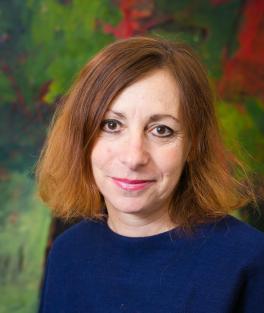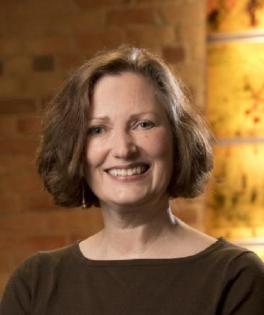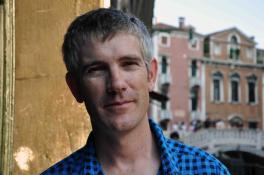
The auditorium of Hagerty Hall was packed as the lecture series “Innovative Interdisciplinary Directions in French, Italian, Francophone and Italophone Studies” kicked off with its first speaker on January 19. The year-long series consists of six invited presentations, two cross-disciplinary OSU-based working groups, and a capstone iTunes U course. With the help of the Humanities and the Arts Discovery Theme and many other sponsors, the Department of French and Italian hopes that this initiative will open up discussion about what it means to work in and train students in interdisciplinary fields.
The series began with Karen Pinkus, Professor of Romance Studies and Comparative Literature at Cornell University, who presented a literary approach to thinking about the surface and subsurface in her talk “Down There: Thinking the Subsurface in the Time of Climate Change.” Pinkus has published widely in Italian cinema, literature, and culture, and has spent the last decade focusing on humanities and climate change.

In March, we enjoyed Deborah Jenson, Professor of Romance Studies and Global Health at Duke University, and her talk on “Firmin’s Area: From the 19th Century Critique of the ‘Epistemic’ Brain to the 20th Century Birth of Haitian Ethnological Psychiatry and Beyond.” Jenson is a scholar of French and Caribbean literature and culture, who also works in the fields of cognitive literary studies and health humanities.
John Foot, Professor of Modern Italian History at the University of Bristol, closed the first half of the series with a talk on psychiatric hospitals in Italy, “Italian Asylums, and Why They Were Closed. The Radical Psychiatry Revolution in the 1960s and 1970s.” Similar to previous speakers, Foot’s lecture crossed the boundaries between Italian Studies and medical humanities.

Faculty and students of OSU gathered in a Working Group in February to discuss the current state and challenges of inderdisciplinary work at our university. The Working Group provided a highly collaborative and productive environment. Local scholars had a chance to present their work to people with whom they usually do not intersect. The event raised many important issues, such as teaching students to work in two fields at the graduate and even undergraduate level, learning to think outside of the discipline in which one was trained, and expressing the importance of cross-disciplinary work to potential funders.
As we move forward in the series, there are many more events to look forward to. The second half will present three more speakers, including Associate Professor of Italian Studies Monica Seger, Associate Professor of French and Italian and American Studies and Ethnicity Edwin Hill, and Professor of Political Science Aurelian Craiutu, and a second working group. Following the completion of the series the event recordings will be combined into an online course, to be used as a resource by students and scholars across the world.
The lecture series is organized by Department Chair and Associate Professor of Italian Dana Renga, Assistant Professor of French Benjamin Hoffmann, and Graduate Administrative Associate, Dan Paul. Paul, a PhD student in Italian, expressed the value of the series to young scholars of humanities like himself. “As a graduate student, it is incredibly helpful to see how people bridge out into other fields,” he explained.
In addition to its value to participating faculty and students, the series is opening up the department and the university to more collaboration. It is creating new niches and new ways of thinking about the world, and bridging the gap between arts, sciences, and humanities.
